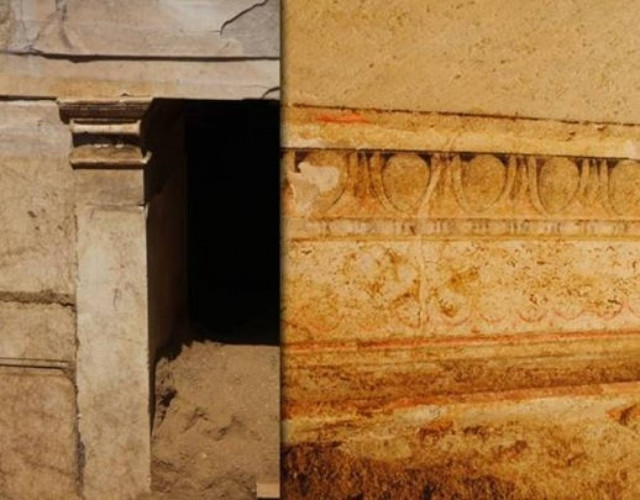Amphipolis: The precious finds of archaeologists and the hidden truth
In the archaeological site in Amphipolis, are taking place maintenance work and the mounting of the decoration by skilled restorers.

As the discoveries of archaeologists in the tomb of Kasta in Amphipolis progressing day by day and more and more findings "see" the light of the sun, the impatience for the revealing of the secrets, which so many years are hiding to the site, is increased.
After the new discoveries of the facade of the entrance of the monument which has a white fresco extremely elaborate and the side walls of the vestibule, which are lined with Thassos marble and adorned the upper part with Ionic architrave, the agony whether the grave has finally been looted or not, is peaking.
As has been repeatedly noted by the archaeologist Katerina Peristeri, "the excavation will tell us if the tomb has been looted or not." She said that it is a "universal monument", adding that it is a "unique tomb, not only in Greece but also in the Balkans."
Who could it be?
According to the newspaper "To Vima", the announcements for the progress of the excavation and any new findings are no longer made by scientists of the excavations of the site but are made of the central Ministry of Culture in Athens.
The version that this is the tomb of Alexander the Great, however, it appears to be declining even within the most warm-blooded.
Remain: The theory of polyandry (a tomb of many warriors - due to the size of the mound).
The case of Nearchos - head of the fleet of Alexander the Great. King Philip II exiled him to Amphipolis, but later he restored by Alexander. He was a famous person, who reportedly arrived in the south coast of Africa in the Indian Ocean, returned after the death of Alexander the Great and sided with the camp of Antigonus.
The case of Roxanne, wife of Alexander the Great, from Bactria (modern Afghanistan) and mother of Alexander IV, who was assassinated in Amphipolis on the 301 BC with her adolescent son, after the order of Kassandros, since Alexander IV was the sole heir of the empire.
























